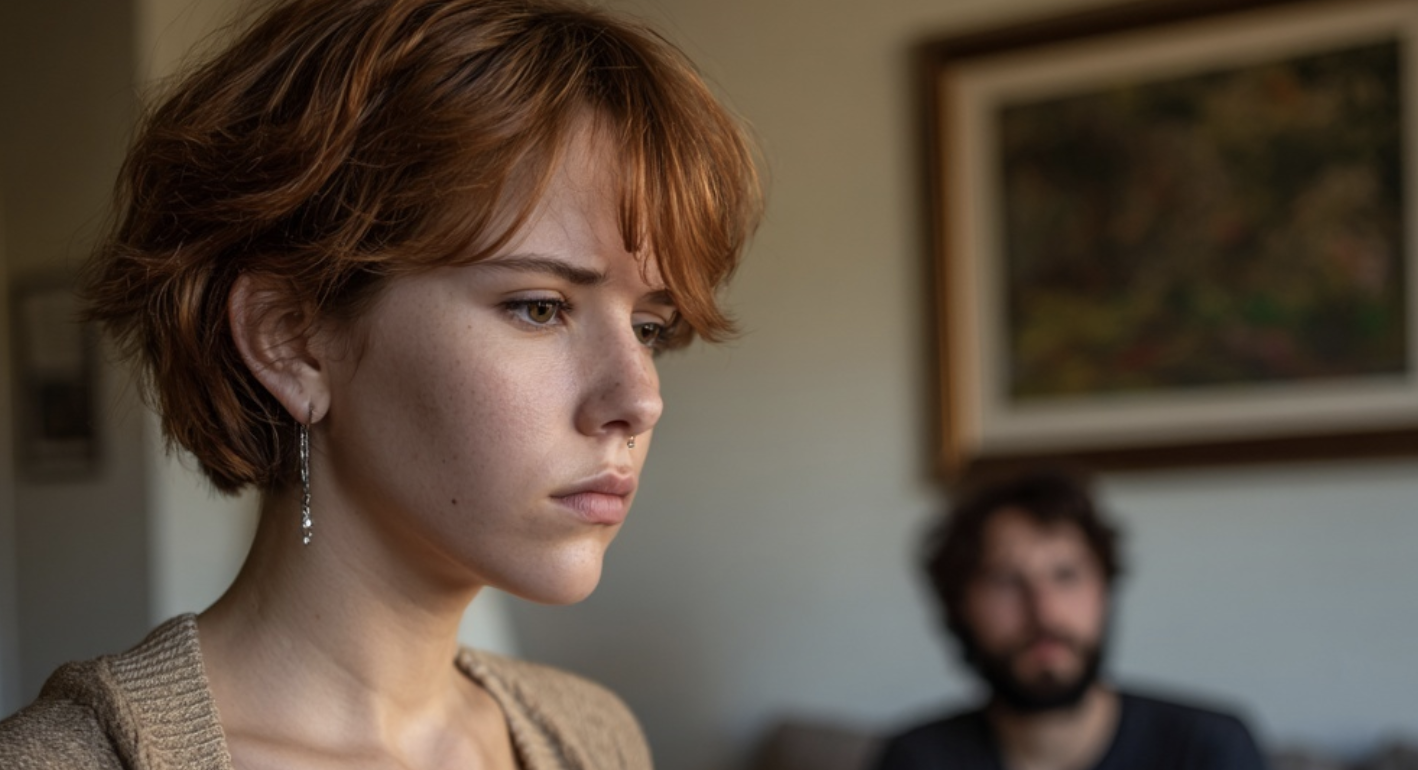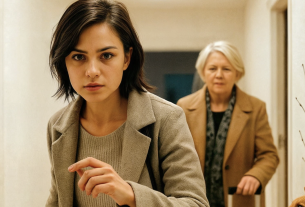When Irina walked into the hallway, the air smelled of tobacco. The light in the corridor wasn’t on—the bulb that Andrey had promised to replace a week ago was still dead. She fumbled for the lamp in the living room, switched it on, and saw her husband sitting on the couch with a weary face and a vacant stare, as if he hadn’t noticed that for nine evenings in a row they had barely exchanged a word.
“Did you eat?” she asked quietly while taking off her coat.
Andrey nodded without lifting his eyes from the floor. Irina knew he hadn’t. Lately he lied about small things, and that irritated her—not the lies themselves, but the indifference with which he delivered them. He used to get angry, argue, flare up. Now there was only silence.
The kitchen was empty. In the fridge—just a jar of mustard, yesterday’s buckwheat, and half a bottle of soy sauce. She opened the cupboard—almost everything she had bought for the week was gone. Even the tea. He hadn’t eaten—he had taken it all. Again.
“Where did you put the food?” she couldn’t hold back, returning to the room. “I stocked up for the whole week. It’s all gone. Again.”
Andrey sighed.
“I brought it to Mom. She has nothing at all, you know that.”
Irina gave a bitter smile, but her eyes didn’t follow.
“And now we don’t have anything either. Do you realize that?”
“It’s temporary,” he muttered. “I’ve handled it. Soon everything will be settled.”
She stepped closer.
“What do you mean ‘settled’?”
“I sold the apartment,” he said almost calmly. “The money’s already transferred. We’re moving out in two weeks. We’ll save Mom’s house, and we’ll stay with her for now—it’s spacious. Later we’ll buy a new place. Together. Everything will be fine.”
Irina felt as though the room had shrunk, the air squeezed tight. She sat down slowly beside him, just to keep from screaming.
“So you didn’t even tell me. You just… sold it. Our apartment. The place where we live. Where I spent my own money on the renovations. Where…”
“Actually, the apartment is mine legally. Why are you starting this again?” he flared up. “All you ever talk about is the apartment. This is about my mother! She’s in trouble! She raised me alone, remember? And now she needs help. Isn’t it obvious who I had to save?”
That was it. Always the same.
Irina stood up. There was no point continuing. Everything had been said before—in countless words, in arguments and in silence. And always, at the center of it, was her. Galina Sergeyevna.
In her mind, memories surfaced: washing someone else’s bedding when her mother-in-law came “for a week” and stayed for a month. Being called “spoiled” because she earned more than Andrey. Being scolded for having her own opinion. And Andrey, always saying: “Just put up with it. It won’t last long.”
It turned out to be forever.
“I’m leaving,” Irina said.
“Where will you go?”
“I don’t know. But definitely not to your mother’s.”
He was silent. Then suddenly jumped up and came closer.
“Are you serious? Over an apartment? You’re ready to throw everything away?”
She looked at him as though seeing a stranger. The husband she had once chosen was gone. What remained was a son devoted to his mother, ready to burn bridges for a single phone call.
“Not because of the apartment, Andrey. Because to you—I’m nothing. My opinion means nothing. You didn’t even think to ask me. You just decided, the way it suited you. And I’m just an accessory.”
“You’re exaggerating…”
“No. I’ve just realized where my place is. And it isn’t next to you.”
She didn’t cry. The tears had run out long ago. All that remained was the feeling of holding on to something that no longer existed—like clinging to the railing of a train long since departed.
Andrey sat back down on the couch. He didn’t even try to stop her.
Irina went silently to the bedroom. The bag was nearly packed. She had known this day would come—had only hoped it would be later. Or never.
She had nowhere to go. But staying was worse.
…
Irina sat in a café near the metro, staring into a cup of coffee that had no taste or smell. Her friend Nina asked no questions. She simply came, sat down beside her.
“Can I stay with you for a few days?” Irina asked. “I just need time to think. I don’t want to regret leaving in a fit of anger.”
Nina snorted.
“You didn’t leave in a fit of anger. He burned it all in a fit of anger. You just didn’t realize it right away.”
Irina nodded.
…
That night she stayed at Nina’s tiny apartment, where the scent of fresh laundry mixed with perfume and cat fur. She slept badly. Faces flashed through her dreams—Andrey, his mother, herself from the outside, like an old video: smiling, painting the bedroom walls blue, saving for furniture, signing for deliveries. All of it—pointless now. All of it—belonging to someone else.
Galina Sergeyevna had her own plans. She called her son several times a day, demanded updates, asked when the rest of the money would come. The house was already under foreclosure. Collectors had been at her door weeks ago, neighbors pretending she wasn’t home. The debt—almost a million. She claimed she had given the money to a relative for a coffee shop. He disappeared. No contract. Just a scribbled IOU on a scrap of paper.
“You understand,” she whined to Andrey, “without you, I’m finished. That house is all I have. It’s your childhood home! I raised you there! How could you let them throw me out?”
Andrey understood. He was afraid. Ashamed. And doubly burdened, because he had to choose between the woman who gave him life and the woman with whom he had tried to build it.
But the choice had already been made.
…
On the third day Irina received a message from him:
“I didn’t want this. I’m sorry. You can come back—I’ll fix everything.”
She didn’t answer right away. She went first to their apartment building. Stood at the door. The stairwell smelled of fresh paint—someone had redone the walls. Through the door she heard his mother’s voice, loud on the phone. Talking about loans. Saying, “Everything’s under control now.” No hint of guilt.
Irina turned and went downstairs quietly. Back at Nina’s, she finally cried—for the first time in days. Quiet tears, almost soundless.
…
A week later she rented a studio apartment with a narrow stove and an uncomfortable sofa. She quit her old job—she couldn’t stand facing colleagues who still saw her as “Andrey’s wife.” She joined an editorial office. The salary was better. No one asked questions.
Every morning she made herself porridge, read the news, listened to the neighbor teaching his child to count. Sometimes they met by the elevator. Irina smiled—just to remember that kindness was still possible, without fear it would be used against her.
One evening in the grocery store she almost bumped into Andrey. He was standing by the vegetables, slouched as before. In his hands a bag of potatoes, face haggard, eyes confused.
“Ira,” he breathed, as if seeing not a person, but a dream he didn’t want to wake from.
She stopped, but didn’t come closer.
“How are you?”
“Living with Mom. It’s hard. I… you know I ruined everything.”
She was silent. He looked at her with hope—that she would say she forgave him, that she’d come back, that they could start over.
But she didn’t.
“I filed for divorce. I hope everything works out for you,” Irina said calmly. “Truly.”
And she walked past him. Without looking back.
He didn’t follow.
…
Irina stepped out of the store and walked slowly home. The air was cool. At the bus stop an old woman stood with a string bag, a young man smoked while scrolling through his phone. Life went on as though nothing had happened. And truly—for the city, nothing had. Just another woman leaving her husband. Some would say, “So what, they weren’t compatible.” And some would never understand how many years she had tried to adapt, persuade, smooth over, swallow, reconcile.
Almost a year passed.
Irina cut her hair into a bob, signed up for swimming, and took weekend trips to Suzdal—alone, with a backpack and the camera she hadn’t touched since getting married. She still felt sadness. Especially in the mornings, when she wanted to share some little thing and realized there was no one to tell. But it was no longer the old pain. Not about loss—about the quiet that follows a storm.
Nina once told her:
“You look like someone who doesn’t owe anything anymore. Not to a husband, not to a mother-in-law, not to life. You’re just—you. I haven’t seen you like this in years.”
Irina smiled. She still remembered. Remembered everything. But no longer with the desire to go back.
…
Andrey lived with his mother in a rented two-bedroom. He had sold his own place, paid off her debt. The remainder lasted a year, then things got hard. After saving the house, Galina more and more often complained of poor health, refused to move back—said it was dull, too remote. He was angry but stayed silent. There was nowhere else to go. The divorce was finalized, Irina received a small settlement. Whether it was generosity or an attempt to win her back—unclear.
Irina didn’t answer his calls. Nor his messages. Sometimes Andrey looked at her social media. Saw photos from museums, exhibitions, cafés. She was alive again.
He wasn’t.
…
One spring Irina rode the bus when a boy of about eight sat down with his mother. He read aloud the names of stops, asking endless questions: “If cars flew in the sky, would clouds get in their way?” His mother answered calmly, without irritation. Irina watched them and suddenly realized—she was no longer angry. Not at her husband, not at his mother.
The anger was gone. What remained was clarity. She would never again return to a place where her voice meant nothing.
She met Pavel. Not in a café, not online, not through friends. Just—in a commuter train. They ran into each other again. And again. He wasn’t like Andrey. Not “better” or “worse.” Just different. Pasha knew how to listen. He didn’t try to change her. And didn’t pretend to know everything better.
Everything happened slowly. Without vows or passion. Just—peacefully.
One day Irina passed the building where she had once lived with Andrey. The new tenants had hung green curtains. Flowerpots stood on the windowsill. She lingered a moment, then walked on.
Without looking back.
Because now she had everything: freedom, quiet, inner strength. She no longer had an apartment. No past. No shared photo albums.
But she had herself. Whole. Real. Certain that if she ever had to choose again—she would choose herself. And never again let anyone turn her into someone’s shadow.



